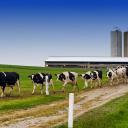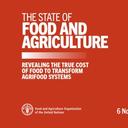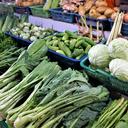The Lancet: Diet and food production must radically change to improve health and the planet!

The Lancet: Diet And Food Production Must Radically Change To Improve Health And Avoid Potentially Catastrophic Damage To The Planet
Date posted: 17 January 2019
Transformation of the global food system is urgently needed as more than 3 billion people are malnourished (including people who are undernourished and overnourished), and food production is exceeding planetary boundaries – driving climate change, biodiversity loss, pollution due to over-application of nitrogen and phosphorus fertilizers, and unsustainable changes in water and land use. The findings are from the EAT-Lancet Commission which provides the first scientific targets for a healthy diet from a sustainable food production system that operates within planetary boundaries for food. The report promotes diets consisting of a variety of plant-based foods, with low amounts of animal-based foods, refined grains, highly processed foods, and added sugars, and with unsaturated rather than saturated fats. Human diets inextricably link health and environmental sustainability, and have the potential to nurture both. However, current diets are pushing the Earth beyond its planetary boundaries, while causing ill health. This puts both people and the planet at risk. Providing healthy diets from sustainable food systems is an immediate challenge as the population continues to grow – projected to reach 10 billion people by 2050 – and get wealthier (with the expectation of higher consumption of animal-based foods).
To meet this challenge, dietary changes must be combined with improved food production and reduced food waste. The authors stress that unprecedented global collaboration and commitment will be needed, alongside immediate changes such as refocussing agriculture to produce varied nutrient-rich crops, and increased governance of land and ocean use. “The food we eat and how we produce it determines the health of people and the planet, and we are currently getting this seriously wrong,” says one of the commission authors Professor Tim Lang, City, University of London, UK. “We need a significant overhaul, changing the global food system on a scale not seen before in ways appropriate to each country’s circumstances. While this is unchartered policy territory and these problems are not easily fixed, this goal is within reach and there are opportunities to adapt international, local and business policies. The scientific targets we have devised for a healthy, sustainable diet are an important foundation which will underpin and drive this change.”
The Commission is a 3-year project that brings together 37 experts from 16 countries with expertise in health, nutrition, environmental sustainability, food systems, economics and political governance.
Transforming The Global Food System
The Commission proposes five strategies to adjust what people eat and how it is produced.
Firstly, policies to encourage people to choose healthy diets are needed, including improving availability and accessibility to healthy food through improved logistics and storage, increased food security, and policies that promote buying from sustainable sources. Alongside advertising restrictions and education campaigns, affordability is also crucial, and food prices must reflect production and environmental costs. As this may increase costs to consumers, social protection for vulnerable groups may be required to avoid continued poor nutrition in low-income groups.
Strategies to refocus agriculture from producing high volumes of crops to producing varied nutrient-rich crops are needed. Currently, small and medium farms supply more than 50% of the essential nutrients in the global food supply. Global agriculture policies should incentivise producers to grow nutritious, plant-based foods, develop programmes that support diverse production systems, and increase research funding for ways to increase nutrition and sustainability. In some contexts, animal farming is important to nutrition and the ecosystem and the benefits and risks of animal farming should be considered on a case-by-case basis.
Sustainably intensifying agriculture will also be key, and must take into account local conditions to help apply appropriate agricultural practices and generate sustainable, high quality crops.
Equally, effective governance of land and ocean use will be important to preserve natural ecosystems and ensure continued food supplies. This could be achieved through protecting intact natural areas on land (potentially through incentives), prohibiting land clearing, restoring degraded land, removing harmful fishing subsidies, and closing at least 10% of marine areas to fishing (including the high seas to create fish banks).
Lastly, food waste must be at least halved. The majority of food waste occurs in low- and middle-income countries during food production due to poor harvest planning, lack of access to markets preventing produce from being sold, and lack of infrastructure to store and process foods. Improved investment in technology and education for farmers is needed. Food waste is also an issue in high-income countries, where it is primarily caused by consumers and can be resolved through campaigns to improve shopping habits, help understand ‘best before’ and ‘use by’ dates, and improve food storage, preparation, portion sizes and use of leftovers.
The EAT-Lancet Commission is one of several reports on nutrition being published by The Lancet in 2019. The next Commission – The Global Syndemic of Obesity, Undernutrition, and Climate Change – will publish later this month.















